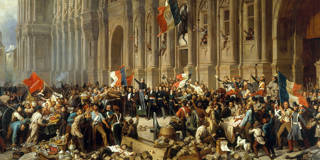At a time of seemingly uncontrollable environmental, geopolitical, and economic crises, the revolutionary wave that swept Europe in 1848 has much to teach us. It, too, revealed the chaotic potential of an interconnected world, the limits of governance, and the path to a more manageable future.
PRINCETON – The historian Christopher Clark’s profound and illuminating new book, Revolutionary Spring: Fighting for a New World, 1848-1849, is a masterly demonstration of how remote historical periods can sometimes speak with urgency to the present. Indeed, the distant past can be a better guide than even the most informed analyses of current events. In this magisterial study of the revolutions that swept through most of Europe in 1848-49, Clark concludes that, “It is impossible not to be struck by the resonances” to our own time.
Then as now, Clark notes, multiple crises erupted simultaneously, exposing the chaotic potential of an interconnected world. And then, too, the era was characterized by a “loss of cohesion under democratic conditions, the failure of dialogue, the hardening of orthodoxies impervious to argument, the inability to prioritize key objectives and coalesce for the purpose of pursuing them.” People were torn by “churn and change without a settled sense of the direction of travel.”
Europe’s famous revolutionary year was just as much of a polycrisis as anything we are experiencing today. But how should one analyze it? Given the multiplicity of events unfolding centrifugally across the continent, Clark’s ability to package it all into a comprehensible, fast-flowing narrative is itself a formidable achievement. The only recent analog I can think of is Simon Schama’s compelling interpretative narrative of the French Revolution, Citizens, which he wrote for the revolution’s second centenary in 1989. Schama’s book also moves elegantly between the centers of revolution and reaction in France, but he had the advantage of confining his focus to just one country.

PRINCETON – The historian Christopher Clark’s profound and illuminating new book, Revolutionary Spring: Fighting for a New World, 1848-1849, is a masterly demonstration of how remote historical periods can sometimes speak with urgency to the present. Indeed, the distant past can be a better guide than even the most informed analyses of current events. In this magisterial study of the revolutions that swept through most of Europe in 1848-49, Clark concludes that, “It is impossible not to be struck by the resonances” to our own time.
Then as now, Clark notes, multiple crises erupted simultaneously, exposing the chaotic potential of an interconnected world. And then, too, the era was characterized by a “loss of cohesion under democratic conditions, the failure of dialogue, the hardening of orthodoxies impervious to argument, the inability to prioritize key objectives and coalesce for the purpose of pursuing them.” People were torn by “churn and change without a settled sense of the direction of travel.”
Europe’s famous revolutionary year was just as much of a polycrisis as anything we are experiencing today. But how should one analyze it? Given the multiplicity of events unfolding centrifugally across the continent, Clark’s ability to package it all into a comprehensible, fast-flowing narrative is itself a formidable achievement. The only recent analog I can think of is Simon Schama’s compelling interpretative narrative of the French Revolution, Citizens, which he wrote for the revolution’s second centenary in 1989. Schama’s book also moves elegantly between the centers of revolution and reaction in France, but he had the advantage of confining his focus to just one country.